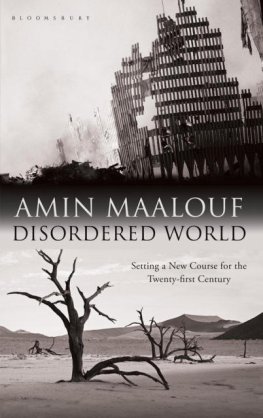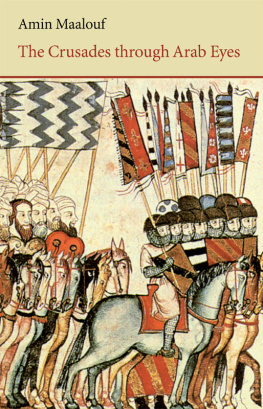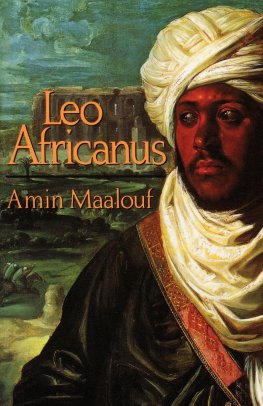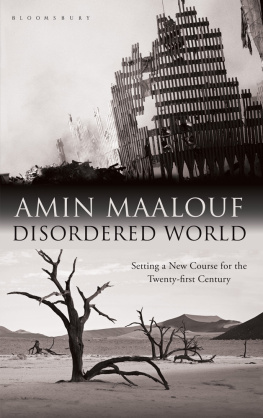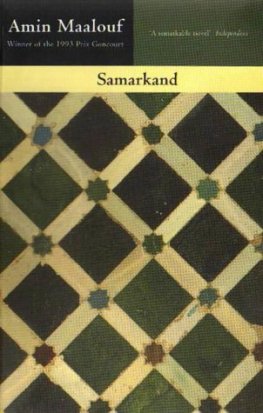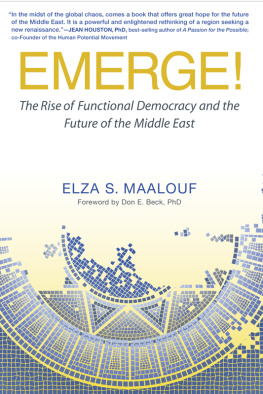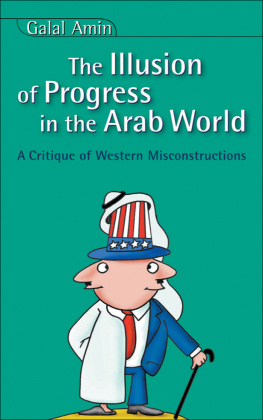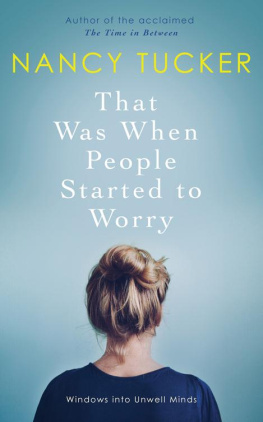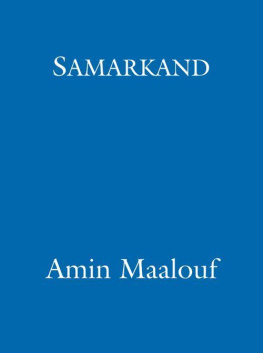Amin Maalouf
DISORDERED WORLD
Setting a New Course for the Twenty-first Century
Translated from the French by George Miller
For Marlne and Salim Nasr
And in memory of Paolo Vida (19482005)
Man has survived hitherto
because he was too ignorant to know
how to realize his wishes.
Now that he can realize them,
he must either change them
or perish.
from Orchestra,William Carlos Williams,
Collected Poems (1954)
Preface to the English Edition
I thought it useful to write a preface to this edition, because the thesis at the heart of this book suddenly, and spectacularly, appeared at the very front of the world stage in the early months of 2011 and seems likely to remain there for some time to come.
In examining what I have called a disordered world, I came to the conclusion that one of the roots of the problem was that leaders of the Arab world lacked legitimacy in the eyes of their people. Deprived of freedom, dignity, a future and the revenues their countries have earned from oil and other natural resources which have been misappropriated by ruling families, many Arabs had succumbed to despair, to the point of contemplating suicide. There is scarcely any need to mention that extremists have profited from this state of mind to recruit militants ready to become suicide bombers.
Paradoxically, the Arab spring also began with suicides. But in this case they had a very different political and ethical meaning: they were not acts of murder but self-sacrifice in the manner of the Buddhist monks who set fire to themselves in Vietnam in the 1960s. A man prepared to die for a cause becomes a powerful weapon, and the Arabs have discovered that this weapon is infinitely more effective when it ceases to be destructive, hate-filled and murderous, and is instead put to the service of universally recognised values liberty, democracy, integrity, transparency and the right of every human being to dignity and a decent life.
Yes, we are desperate, countless Arab protesters said through their actions. Yes, we are ready to sacrifice ourselves, but we will die like saints, like true martyrs, not like murderers. We will not kill and we will not destroy. Salmiyah! (We are peaceful!) the demonstrators chanted every time anger levels rose, in order to calm their opponents and moderate their fellow protesters. No violence! We want only to live, to be able to express ourselves freely, to sing, and to connect with the rest of the world like young Europeans and Americans and all other peoples. We are heirs to a great civilisation and deserve the best.
From the first uprisings, the crowd chanted famous lines by the Tunisian poet Aboul-Qacem Echebbi:
If the people one day desire life
It is inevitable that destiny grants it
It is inevitable that the darkness lifts
The desire for life and preference for non-violent action were to remain a deep inspiration to the movement. In this sense, the Arab spring of 2011 represents the most eloquent and in the long run the most effective riposte to the attacks of 11 September 2001 and the jihadist ideology which inspired them.
Long before Osama bin Laden collapsed in a hail of US commando bullets in his compound in Abbottabad in May 2011, his strategy had already collapsed in the streets of Arab towns. He himself implicitly recognised this in his last statement, which was disseminated shortly after his death and differed in both tone and content from his previous pronouncements: making no mention of the armed struggle, he spoke bizarrely of representative assemblies and research institutes, and concluded with a saying of the Prophet which states that the most venerable of martyrs are those who stand up to authority to accuse them and those who are killed for their courage in speaking out.
Of course, terrorism such as we have seen since the start of this century will not disappear overnight; for some time to come it will retain its power to do harm. But for the people in whose name it claims to speak, it has now been consigned to the past. In overcoming their fear of dictators, the Arabs have overcome their indulgence towards terrorists.
Under autocratic rule, militant extremists were sometimes like fish in water. Their acts, however absurd, seemed a plausible response to the atmosphere of despair; and for lack of any alternative, many were willing to support them. Today, millions of men and women can hold their heads high and say that they themselves are heroes; they defied dictatorships, braved police repression, stood directly in the line of fire and helped liberate their people without soiling their hands or blackening their souls.
Up until recently, the Arab world had been caught in the crossfire of two groups of usurpers: those who seized power and wealth in the name of the nation or a dynasty, or in the name of stability and the fight against extremists; and those who invoked the name of Islam to advance their own intolerant, regressive political agenda.
What is more, these two types of usurpation reinforced each other. Under the pretext of fighting terrorism, autocrats won recognition, help and support; when the level of this support sometimes flagged, some regimes had no compunction about committing terrorist attacks themselves, which they attributed to the Islamists, so as to appear as a useful bulwark to the international community. The debate over whether it was religious fanatics or state agents who bombed such and such a church, carried out a particular massacre or assassinated a certain individual will last a long time.
The whole world seemed to believe that this perverse status quo would last for ever. How could it not, it was said, since the people themselves are resigned to it? But the peoples patience was not infinite.
The signal for the great uprising was given by a young Tunisian street vendor, Mohammed Bouazizi, who set fire to himself after a municipal official slapped him in public and confiscated his vegetable cart. He died after eighteen days of agony on 4 January 2011. His act of despair was seen by his compatriots as a reflection of their own. But, they reasoned, if we are prepared to die, what is the sense of each of us dying in our own little corner? Why not march against those who oppress and terrorise us? We may well be arrested and beaten, even gunned down in our tens or hundreds, but at least we will have the satisfaction of dying with our heads held high, trying to bring down tyrants.
When, faced with this unexpected determination, the authorities seemed to hesitate, retreat or waver, it was initially a marvellous surprise and a terrific incentive for the protesters to go all the way first in Tunisia, then in Egypt and then in other countries. More mass demonstrations sprang up, as did clashes with the security forces. And established regimes, which were hated by their people and had held on to their power for decades through intimidation and terror, began to crumble one after the other like rotting edifices: Zine-el-Abidine Ben Ali left Tunis on 14 January, twenty-three years after the coup detat that brought him to power; Hosni Mubarak left Cairo on 11 February, in the thirtieth year of his presidency. The movement soon sent shock waves of varying intensity through various Arab regimes.
After these first dazzling successes, there was a feeling that peaceful protest was going to have an almost miraculous domino effect throughout the entire region, linked in part to new means of communication Facebook, Twitter, YouTube, smartphones, etc. which would accelerate and amplify the movement, giving it a resonance among both local populations and international opinion. But subsequent events soon tempered that initial euphoria.
The turning point came first in Libya. Demonstrations began in Benghazi on 15 February and rapidly spread throughout the country. Up until then, Colonel Muammar Gaddafi, who had been in power for almost forty-two years, seemed immoveable. So it was astonishing to see a scenario similar to those in Tunisia and Egypt beginning to be played out there, too. Of course, from its earliest days it was violently repressed, creating hundreds of victims, but the protests kept on growing and by the end of that week speculation had begun as to the likely destination for the exile of the soon-to-be-ousted dictator. There were persistent rumours that he was already on his way to Venezuela.

